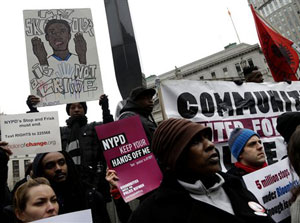
NEW YORK (AP) — Police officials were not concerned with whether patrol officers were saving lives or helping people under a policy that required them to detain and sometimes search anyone they deemed suspicious. They were focused on one thing: numbers, according to a New York City police officer testifying in a federal challenge to some street stops.
Adhyl Polanco said his superiors told him that he needed 20 summonses, five street stops and one arrest per month. It didn't matter whether the stops were done properly, he said.
"They will never question the quality. They will question the quantity," Polanco said Tuesday.
Polanco, whose testimony continued Wednesday, was one of two department whistleblowers expected to discuss a culture that revolved more around numbers and less around actual policing — and what lawyers said is leading to tens of thousands of wrongful stops of black and Hispanic men.
The lawsuit has been granted class-action status, meaning thousands of people who have been stopped over the years could potentially join the complaint introduced by the Center for Constitutional Rights on behalf of four black men.
The class-action lawsuit in federal court challenges the constitutionality of some of the stops because they disproportionately target blacks and Latinos.
There have been about 5 million stops made by police in the past decade. City attorneys said officers operate within the law and do not target people solely because of their race. Police go where the crime is — and crime is overwhelmingly in minority neighborhoods, they said.
The suit seeks a court-appointed monitor to oversee changes in how the police make stops. The trial, expected to last more than a month, includes more than a hundred residents, police officers, scholars, and lawmakers to testify.
Polanco said Wednesday that if he didn't get the numbers he'd face poor evaluations, shift changes, and no overtime.
Police officials have said that they do not issue quotas, but set some performance goals for officers.
Polanco, who joined the force in 2005, was suspended with pay for years after internal affairs officers brought charges of filing false arrest paperwork; he says the charges came because he detailed a list of complaints to internal affairs. He now works in a department video unit.
The officers' testimony comes in the first week of the case, after four black men spoke about their experiences of being stopped by police — they say because of their race.
The mayor and police commissioner say stop and frisk is a life-saving, crime-stopping tool that has helped drive crime down to record lows. Officers have more than 23 million contacts with the public, make 4 million radio runs, and issue more than 500,000 summonses every year. Comparatively, 600,000 stops annually are not unreasonable, city lawyers said.
 U.S. District Court Judge Shira Scheindlin, who has already said in earlier rulings that she is deeply concerned about the tactic, has the power to order reforms in how it is used, which could bring major changes to the nation's largest police force and other departments.
U.S. District Court Judge Shira Scheindlin, who has already said in earlier rulings that she is deeply concerned about the tactic, has the power to order reforms in how it is used, which could bring major changes to the nation's largest police force and other departments.
On the second day of the trial, city lawmakers said they had reached an agreement to install an inspector general for the NYPD following outrage over the Departments monitoring of Muslims, and the stop and frisk tactic. The mayor has said he would veto the proposal, which has been condemned by police unions.
It's not clear whether the proposal for an inspector general would affect what changes the judge may make.
Mayor Michael Bloomberg, city lawyers, and police officials said the department already has enough oversight, including an independent watchdog group, a 700-person Internal Affairs Bureau, a police corruption commission, prosecutors, and judges.
Associated Press writers Larry Neumeister and Jennifer Peltz contributed to this report.
Copyright 2013 The Associated Press.

Comments
Thought provoking
I honestly don't know how I feel about this article. The officer testified that he was given a quota or a performance goal and it does make sense to patrol in high crime areas.
I live in a upper middle class neighborhood that has recently seen a rise in very petty crime. Our neighborhood bulletin board has been alive with suggestions that we request a greater police presence, even some suggesting 24/7 patrols. All we have been victim to are property crimes. Now under these conditions and given a quota, would officers do as many stop and frisks? Would they only stop the construction workers in the neighborhood or minorities who live here, or any resident who is out walking around looking suspicious. I don't know but I'd love to find out. Especially the social scientist in me ...
Were the individuals targeted because of their race specifically or because they happened to live in a low socio-economic area and many police officers meeting quotas stopped them over their life time compounding the stereotyping affect? It is still an injustice - no doubt. How we define the problem will affect the solution though.